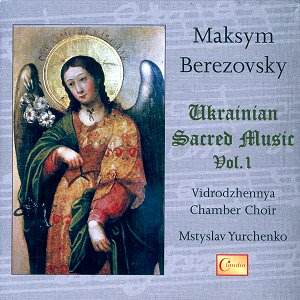Berezovsky’s contribution to Russian musical life was
significant. There is debate as to his year of birth – though 1745 seems
to be a reasonable guess – and legend has it that he was born "to
Cossacks in the town of Glukhov" in Eastern Ukraine. But his apprenticeship
was a classic one, entirely familiar to composers in Western Europe
– he studied under Padre Martini in Bologna, writing the first opera
and Violin Sonata by an Ukrainian/Russian composer. The notes of this
most welcome disc are somewhat elliptical on the point but I infer that
he committed suicide at 32.
The CD divides broadly into two parts – Liturgy and
Eucharistic Verses. It seems fair to agree with the sleeve-note that
musico-religiously Berezovsky’s impulse was to try to bring the form
of Ukrainian liturgy closer to the Catholic Mass. Presumably his firm
Italian grounding had equipped him to that effect and the impress of
the music, notwithstanding the native forms Berezovsky employs, seem
to demonstrate it conclusively. In the Credo of the Liturgy, the remarkable,
rapid homophonic chant is one such example of Berezovsky’s use of a
national tradition. It is a spectacular piece of music, well negotiated
by the choir, and was published several times in Russia in the nineteenth
and twentieth centuries. Typically eloquent expressively is Meet
it is, a small masterpiece of a setting from the Liturgy.
The Eucharistic Verses consist of two stanza verses
and a refrain to "Alleluia." Within the seemingly limited,
indeed self-limiting form, Berezovsky constructs compact polyphonic
movements. The flexible basses in The Salvation Cup I will receive
embody an already characteristic Russian tradition. In Joy for the
Blessed, a very short setting, we can hear some wayward and exposed
voices in the female choir – there is some bulging of the line elsewhere,
notably from the women. There are three settings of Praise the Lord,
of which the third is the most propulsive, devotionally ecstatic and
least inward looking. Let the Lord Enthrone is one of the so-called
Choral Concerts, a form at which Berezovsky was particularly adept and
one of only three such to survive. His Italianate training equipped
him with a sure lyrical gift, though the work is itself thematically
uncomplex. Nevertheless his singular sensitivity for word setting and
placement is always in evidence. In four recognisable movements in its
barely six minute span it brings to an end a revealing disc. A pity
there are no texts.
Jonathan Woolf


